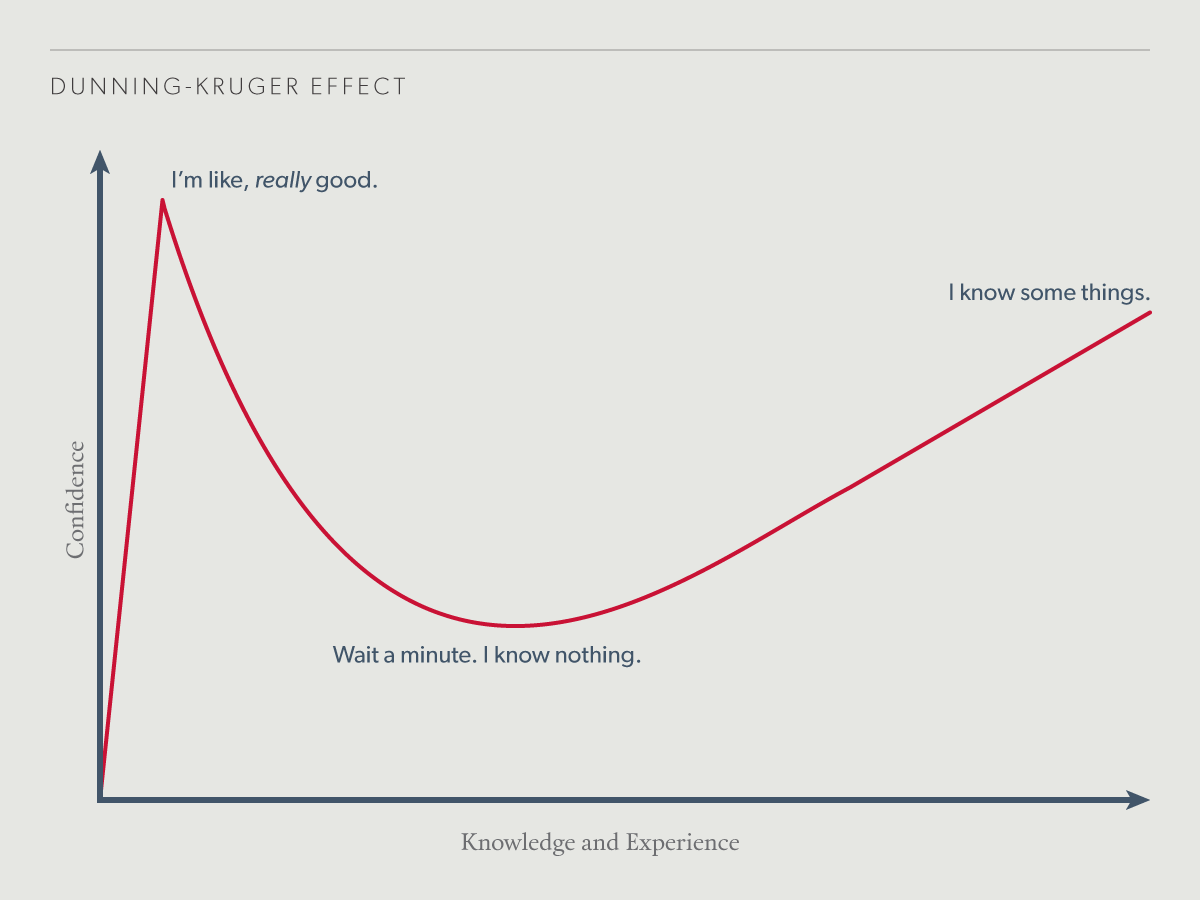
We might assume lawyers can write based on the intelligence and education needed to complete law school and pass the bar. But for all their brains, lawyers have a reputation for being terrible writers. And they might not even realize it.
How does a person go through seven years of university and come out the end blissfully unaware of their weak writing skills?
A popular theory is that lawyers, in general, fall victim to the Dunning-Kruger effect.
What is the Dunning-Kruger Effect?

Studies by Dunning and Kruger, Cornell University psychologists, showed that unskillful or unknowledgeable people:
- Tend to think the opposite – that they are skillful;
- Are unable to recognize skill in others;
- Don’t recognize their inadequacy;
- Only realize and acknowledge their lack of skills after being trained in the skill.
On the flip side, they found that truly skilled people overestimate other people’s skills while underestimating their own.
And really, that could be true in many fields – it’s not only lawyers who are accused of being terrible writers. The Plain Writing Act of 2010 addresses the knowledge gap between federal agencies and the general public. In healthcare, for example, the CDC’s guidelines for communicating health information using plain language are very similar to the Law Society of Alberta writing recommendations.
In general, you should:
- Organize your information to serve your audience;
- Use language your audience knows;
- Write in the active voice;
- Write short sentences;
- Format your text for ease of reading.
The CDC recognizes how disparities in health literacy can affect patient outcomes. Likewise, the Law Society recognizes the need to write to promote understanding of the law.
So why is it so challenging for lawyers? Some possible reasons are:
Our Deeply Ingrained Court Culture
You’re writing the way we’ve always written, following a precedent set hundreds of years ago. Rulings from previous cases guide new ones; it’s how consistency is maintained in law. Day to day, lawyers spend a good deal of time reviewing past cases, and the language they use is thus handed down from generation to generation.
Safeguarding Interpretation
When legal phrases and terminology can be interpreted to mean different things, it’s essential to guard against future attempts to misinterpret your words. Thus, more words are necessary to make a text more concise, a concept opposite to the norm. In most writing, fewer words are often the hallmark of clearer, more concise text. The need for technical legal statements also means your text is dry, technical, and dull. While that level of technicality is appropriate if you’re writing for a judge or other lawyers, it will render client-facing writing almost unreadable. It’s critical to consider your audience.
History
And then, of course, our legal system has its roots in ancient Rome, further complicating our writing with obscure Latin terminology. It may not be a great idea to use terminology that originated in 449 BCE in modern life. Still, efforts to update the legal lexicon to use plain language have been slow to catch on. Again, depending on the audience, it might be appropriate to sacrifice legal precision in favour of understandable language.
Knowledge is a Curse!
Like many other professionals, specialists, or even hobbyists, we’re often so comfortable with our own language that we forget how specialized our language really is. We’re so familiar with legal terminology and concepts and the odd sentence structures peppered with unpronounceable Latin phrases that we forget ourselves and assume others know both Latin and legalese. We read, write, hear, and speak it every day, and it simply becomes so ingrained in our habits that we overestimate the chances that our readers will understand us. Sometimes, knowledge is too much of a good thing.

Law School Teaches Law, Not Writing
Remember law school? Stuffiness and hyper-formality are the norms in law school. Classes are taught by lawyers using the same historical cases full of legalese and poorly written opinions that we’ve always used. But we don’t care – we’re there to learn the law, not to learn to write!
How much does it cost?
Communicative writing for laypeople is a difficult undertaking. It’s even more challenging to do it well. Investing hours into writing content for your blog instead of billing your time doesn’t make sense. It will take you longer — at a significantly higher cost — to produce a piece of writing than a professional writer.